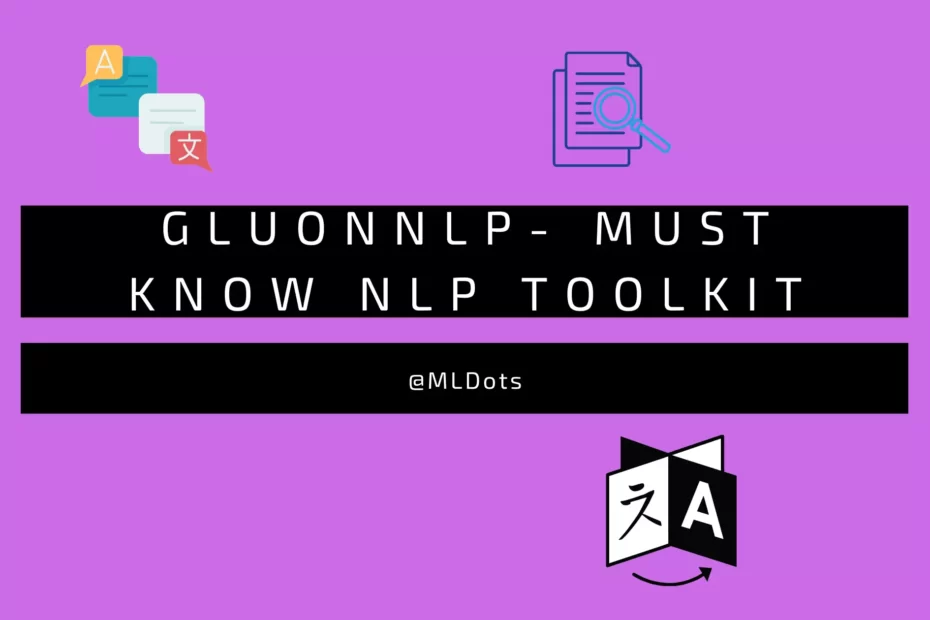Searching through text data is a common task for data scientists and computer programmers. Much like the index in your favorite book, there are many ways to search through text data, but if you want to discover some new things about what you are searching for you need an advanced system.
GluonNLP creates an advanced search engine that covers many different search types and gives one of the highest levels of accuracy available today. In this article we will try to cover what, how, when aspect of GluonNLP so that you know it all about it.
What is GluonNLP ?
GluonNLP stands for Gluon Natural Language Processing, and it’s a set of machine learning tools designed to be easy to use. Why would you want to use machine learning? To improve the performance of your application: improve search, find more accurate data in unstructured text, and create new applications that currently aren’t possible.
GluonNLP is an open-source toolkit for Natural Language Processing (NLP) research and development. It provides state-of-the-art pretrained models, data preprocessing and datasets, distributed training routines, TensorBoard visualization and rich Python API support.
The Gluon NLP Toolkit supports a wide range of tasks including text classification, part-of-speech tagging, named entity recognition and question answering. The toolkit also includes a library of components that can be used to build more sophisticated models such as sequence to sequence models (for translation), recurrent neural network language models (for speech recognition) and recursive autoencoders (for syntactic analysis).
How does GluonNLP works ?
GluonNLP is designed for both ease of use and performance. It provides a clear and simple API for deep learning models that enables developers to quickly create neural networks without sacrificing flexibility or performance. GluonNLP also provides high performance training on multi-GPU instances in the cloud or on your local machine.
GluonNLP provides pre-trained models for common tasks like language modeling, sentiment analysis, machine translation and question answering. The library also includes many tools like automatic batching (which allows users to train their own data efficiently), easy model deployment via SageMaker or Azure Machine Learning service, as well as support for running models on GPUs or CPUs depending on your needs.
Users can use GluonNLP for everything from NER tagging (named entity recognition) to document classification without having any knowledge about how these tasks actually work under the hood: just import the correct module from GluonNLP’s API! And if you want even more functionality/speed out of your model then you can try using NVIDIA.
What are the advantages of GluonNLP toolkit ?
It has three advantages:
-Easy model building: allowing you to develop and iterate faster on a variety of models.
-State-of-the-art performance: it includes the latest published research results, as well as pre-trained models for many of them.
-Easy deployment: it offers seamless scalability, whether you want to run your model on a single machine or scale out to large clusters.
let also see some of its challenges :
GluonNLP has three primary challenges:
-The first challenge is how to simplify the development of models based on already-existing frameworks. For example, GluonNLP’s transformer architecture allows developers to define dependencies between different parts of a model with ease. This simplifies the process of modeling text and can help developers produce more accurate results.
-The second challenge is how to improve performance and efficiency. The current version of GluonNLP relies on the use of Apache MXNet, an open source deep learning framework that lets developers test their models in modern hardware environments like Amazon Web Services or Microsoft Azure. The framework helps them take advantage of the latest hardware accelerators, such as GPUs or FPGAs, for faster model training and inference.
-The third challenge is how to make it easier for developers to build scalable applications that are easy to deploy across multiple devices. For example, GluonNLP contains pre-trained neural network models called “artifacts” that can be used for tasks like image classification or text.
When and where to use GluonNLP toolkit ?
luonNLP is a toolkit that allows you to:
-Build, Test, and Deploy Natural Language Processing models
-Develop models using an API that provides customizable and state of the art deep learning architectures
-Apply models to common NLP tasks like sentiment analysis, topic classification, named entity recognition, part of speech tagging
-Use your own custom training data to train original models for individual projects
The following is a list of some of the tasks that GluonNLP supports:
Language modeling
Sentiment classification
Machine translation
Part-of-speech tagging
Dependency parsing
The toolkit is designed to be used either as a standalone toolkit or in combination with other deep learning frameworks, such as Apache MXNet. Deployment-ready models are available for cloud and on-device applications.
GluonNLP offers several advantages over other NLP libraries:
- Easy to use: GluonNLP provides a simple API for training and evaluating neural networks for NLP tasks; this API makes it easy for developers with little or no experience in deep learning to quickly build new models. It includes pre-trained versions of state-of-the-art models that are ready to use out of the box.
Lets see implementation of GluonNLP toolkit
#installing libraries
!pip install mxnet
!pip install gluonnlp
# loading pre-trained model
import gluonnlp as gnlp
import mxnet as mxn
More detail implementation and repo here
GluonNLP is based on a simple idea that any supervised learning is better than no supervised learning. And given a large enough dataset, and the right task to learn, there is nothing that can beat it. Diverse application areas, especially sentiment analysis and IR, have been extensively explored. Advancement of state of art in NLP tasks will continue leveraging GluonNLP. Hope you liked this article at MLDots.
